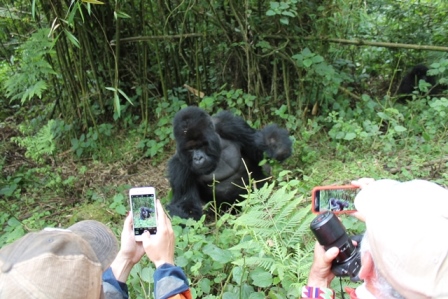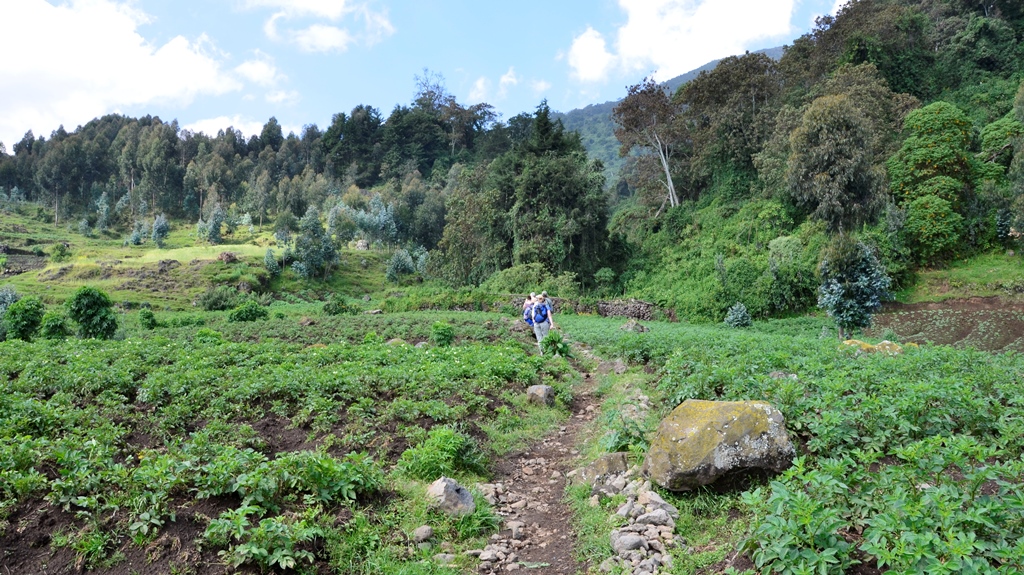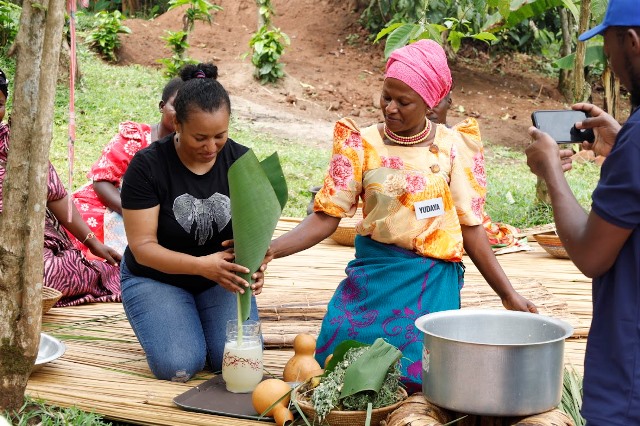
Ewaffe Cultural Village is the place to go (near Kampala) for one to experience authentic African traditions and cultures. This spot is not like many other cultural centers where a few items depicting African traditions and cultures are simply put on display for you to watch, but Ewaffe Cultural Village is a big project nicely set up in rural Uganda giving one an opportunity to experience the life of the local in the old African tradition society and to discover secretes of the Baganda tribe traditional family, for example, the intriguing way DNA of a child was carried out traditionally.
The cultural village spans several acres of rural land and on it are gardens of food that was particularly grown in the Buganda traditional community, a medicinal herb garden containing many herbs and plants that provided a source of medication for ailments, body enhancements and good fortune in life, a well that provides water for home use, small lake (read pond) that provides fish, a bushland and swamp teeming with birds, etc…
On arrival at Ewaffe Cultural Village the enthusiastic team dressed in Baganda traditional attire welcomes you with the traditional Kiganda dance performance, and banana juice served in the traditional gourd/calabash sipped with a bamboo straw. After the warm welcome you proceed to experience the rest of the activities here.
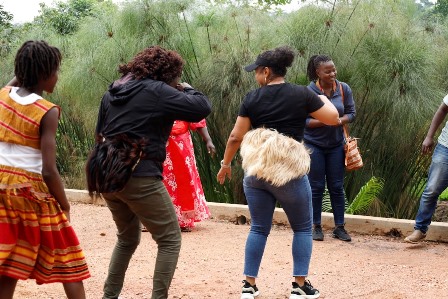
How far / location of Ewaffe Cultural Village
Ewaffe Cultural Village is located in Naggalama, Mukono District, along Kayunga Road. This is only one hour’s drive from Kampala, making it so easy to visit for a one day cultural and village tour. The easiest access route from Kampala is via Ntinda – Najjera – Bulindo – Kitukutwe – Gayaza – Kayunga Road – Naggalama.
From Jinja, it will take about 1.5 hours drive to there.
This convenient location also means it is an easy addition to a number of short trips going this direction such as; a day trip to the source of the Nile and Jinja, to a birdwatching expedition to Mabira forest, visit to Sezibwa falls, Sipi falls hiking tour.
Activities to do at Ewaffe Cultural Village
Traditional Kiganda dance performance
First activity you experience as soon as you set foot at the cultural village you are treated to a traditional Kiganda dance performance. You can join the group and take your first lesson at Kiganda dance or entertain yourself away.
Medicinal herb garden tour
Take the garden tour to learn about many herbs and plants what the traditional society used for a number of remedies such as cure of illnesses, bring good luck, enhance body performance, improve sex life, food and tea spices. Some of the herbs include: aloe vera (kigaji), Tameric (kinzali), Lemon grass (kisubi), Cactus (Kawumpuli), Pomegranate (koma mawanga), Shame plant (muko wewumbe), spear mint, under seed plant (kakumirizi), Sasame (olutungotungo), Alligator pepper (etunguulu), Lion ear (kifumufumu), Ginger bush (Kyewamala), Periwinkle (kamuli ko kumalalo), Bottle grass (nyambala butonya) etc…
Cooking class (preparing a local traditional delicacy Luwombo)
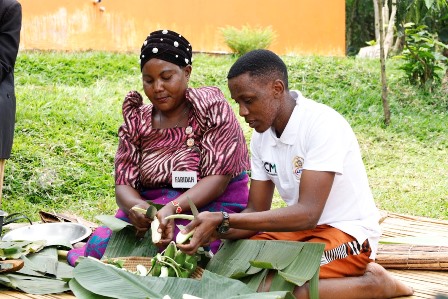
Learn how banana (matooke) is cooked the traditional Kiganda way, starting with peeling and then wrap the peeled banana in banana leaves before placing it in the saucepan.
Another cooking lesson is the preparing of the local delicacy called “Luwombo”, a kind of meal that was prepared for special occasions.
Banana juice and local brew (tonto) making
Learn the delicate process of making banana juice by squeezing with hands the ripe banana (“kayinja/musa”) and spear grass.
The banana juice is the one that then makes the local brew called “tonto”. This is by sprinkling sorghum flour onto the juice and then kept for about three days to ferment.
Basket weaving
In the traditional African home, women stayed home to look after the home, while the men went out to work to provide for their families. One of the ways women (mothers) occupied their free time at home was through basket weaving, a skill that is still present among lots of village women.
At Ewaffe Cultural Village you get to seat down with the ladies (mothers) for a weaving lesson using the local raw materials you will harness from the village.
Bark cloth making
In the African traditional society before clothes came with the foreigners Africans dressed with bark cloth which is made out of the bark of the trees. Even today bark cloth is still used for some traditional and cultural activities in some societies.
At Ewaffe Cultural Village you be taken through the process of making the bark cloth, right from harvesting the bark from the tree.
Fishing
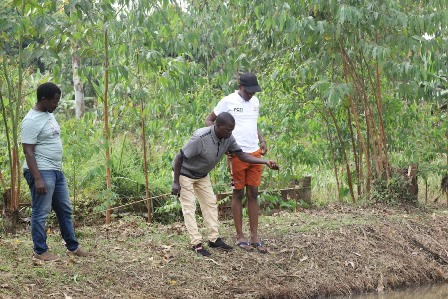
Ewaffe Cultural Village has a large pond they have named Lake Ewaffe and it has lots of fish. Using the fishing line tied on one end to a stick (rod) and a hook on the other end where you put your bait of worm, you will have a good time catching fish for leisure. A local expert fisherman is available to guide you on how to fish.
Sex education and bedroom secretes of the Baganda
One of the must-not-miss activities for marrieds and soon-to-be marrieds is the “Ssenga and Kojja session”. Women (senga) and men (kojja) expert in the sex education will delve into secretes of the African traditional bedroom revealing ways of keeping a great sex life. This session is “x-rated” and only adults are allowed.
Testing DNA the traditional way
Using a basket, water and umbilical cord of a baby it was established if a child belong to the man the mother claimed to be the father. This was always carried by the family of the man. No science can explain this so it is a very intriguing tradition that was used in the African traditional society to test the DNA of a child and prove paternity. You will know all about it at Ewaffe Cultural Village.
Fetching water from the Well
Using a clay pot you will visit the well and fetch water, carrying it on your head like it is done in the African traditional society. It is an exciting village activity for those that have never experienced village life.
Luwombo Lunch
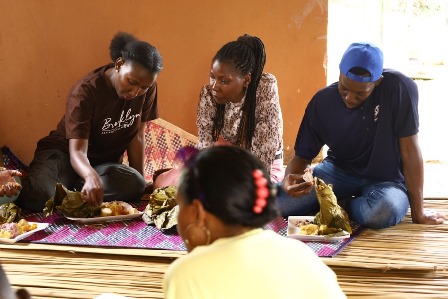
For lunch visitors are served a local dish, the tasty “Luwombo”. Easting “luwombo” at Ewaffe Culture Village is an experience of its own. The meal includes chicken, groundnut sauce, matooke (banana), and sweet potato.
Birdwatching
Away from the culture and traditions, the cultural village is nice place to birdwatch without any interruptions and you will be able to tick off a number of local species. The bushland, gardens, ponds, wetland have a lot of birds. Since the village is not settled, getting there early in the morning and being all by yourself in the place is a rewarding birding experience.
You can spend a couple of hours here before or after birding in Mabira forest.
Leave a comment Cancel reply
Archives
- November 2024 (2)
- October 2024 (3)
- May 2024 (1)
- February 2024 (1)
- January 2024 (2)
- November 2023 (2)
- September 2023 (1)
- July 2023 (8)
- June 2023 (14)
- May 2023 (1)
- April 2023 (1)
- March 2023 (3)
- February 2023 (5)
- January 2023 (6)
- December 2022 (1)
- November 2022 (1)
- October 2022 (2)
- September 2022 (1)
- August 2022 (1)
- May 2022 (17)
- April 2022 (5)
- March 2022 (7)
- February 2022 (3)
- January 2022 (7)
- December 2021 (7)
- November 2021 (2)
- October 2021 (1)
- September 2021 (2)
- August 2021 (2)
- July 2021 (6)
- June 2021 (1)
- May 2021 (4)
- April 2021 (3)
- March 2021 (2)
- February 2021 (2)
- January 2021 (14)
- November 2020 (2)
- September 2020 (1)
- March 2020 (1)
- February 2020 (1)
- August 2019 (1)
- September 2016 (1)
- June 2016 (1)
- May 2016 (1)

